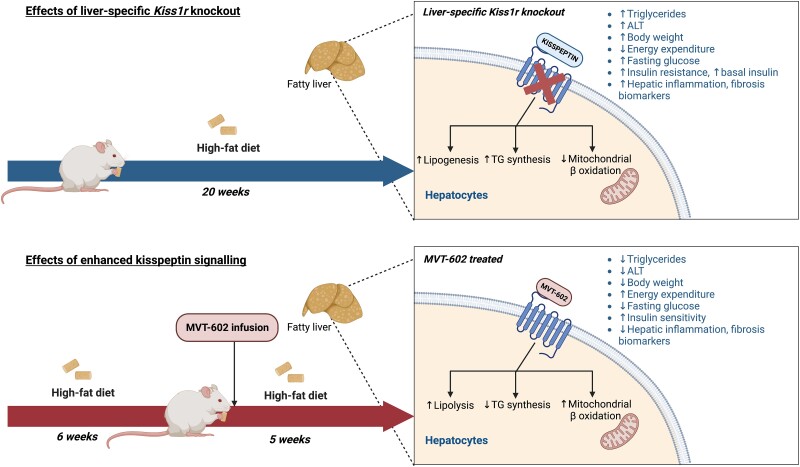Figure 7.
Effects of liver-specific Kiss1r KO and enhanced KP signaling. Liver-specific Kiss1r KO mice model placed on a high-fat diet exhibited increased lipogenesis, TG synthesis, and reduced mitochondrial β oxidation compared to controls. This resulted in increased TG levels, serum ALT levels (indicating hepatocellular injury), and hepatic steatosis. Increased body weight and reduced energy expenditure were observed. Higher fasting glucose and basal insulin levels, indicating glucose intolerance and insulin resistance, were also observed. Moreover, markers of inflammation and early stages of fibrosis were upregulated. Effects of enhanced KP signaling: wild-type mice were placed on a high-fat diet for 6 weeks prior to administration of MVT-602, a KP receptor agonist, for 5 weeks on a high-fat diet. MVT-602 alleviated hepatic steatosis and metabolic deterioration through improvements in insulin sensitivity, lower basal insulin levels, reduced TGs, and ALT levels. MVT-602–treated mice had slightly lower body weight compared to controls with increased energy expenditure in the light phase. Mechanistically MVT-602 treatment under high-fat diet conditions significantly reduced TG synthesis, increased lipolysis, and mitochondrial β oxidation compared to controls. Markers of inflammation and early stages of fibrosis were downregulated. ALT, alanine transaminase; Kiss1r, kisspeptin receptor; KO, knockout; KP, kisspeptin; TGs, triglycerides. Figure created with BioRender.com.

